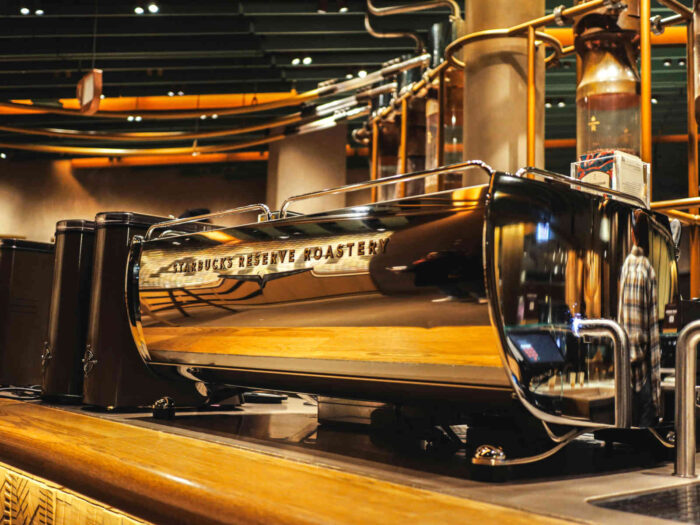
Starbucks Corporation manages stakeholder interests through programs for corporate social responsibility (CSR) and environmental, social, and governance (ESG) goals that match issues relevant to the coffee and foodservice industries.
These issues, such as the ecological and social trends shown in the PESTLE/PESTEL analysis of Starbucks, encourage businesses to integrate corporate citizenship, sustainability, and green business practices into their strategies. In this case, the coffeehouse business advocates CSR-focused social movements pertaining to sustainability.
Based on Archie B. Carroll’s description of corporate social responsibility, Starbucks accounts for stakeholders’ interests and views itself as a citizen of society. The coffee company’s corporate citizenship addresses multiple stakeholder groups, such as employees and farmers.
Corporate social responsibility strategies affect long-term success for business goals and objectives based on Starbucks’ vision and mission. The coffee company’s CSR, ESG, and stakeholder management programs facilitate leadership in the industry.
Starbucks’ Stakeholders & CSR/ESG Initiatives
Starbucks’ corporate social responsibility practices address different stakeholder groups’ concerns. The CSR and ESG practices for corporate citizenship focus on Starbucks’ stakeholders, as follows:
- Employees (baristas, partners) – highest priority
- Customers
- Suppliers (supply firms, coffee farmers, and others)
- Environment and communities
- Investors
- Governments
Employees. Starbucks prioritizes employees in its corporate social responsibility efforts. As stakeholders, employees are interested in better working conditions, job security, and higher wages.
This prioritization agrees with Starbucks’ organizational culture (company culture) and its emphasis on the employees-first attitude. The company sets its employees’ wages above the legally mandated minimum wage. Also, Starbucks boosts its corporate citizenship performance for this stakeholder group by giving scholarships to employees, in partnership with Arizona State University.
Customers. Starbucks considers customers among its top stakeholders. The interests of this stakeholder group include high-quality service and products, such as coffee and other beverages. As the world’s most popular coffeehouse chain, Starbucks effectively addresses these interests through its corporate social responsibility and ESG efforts.
The company extends its corporate culture to customers at its cafés. For example, warm and friendly relations are emphasized in the company and in how baristas interact with customers. This approach enhances Starbucks’ service quality and customer experience.
Also, the company has stringent standards and requirements for its supply of raw materials, like coffee beans. These quality standards contribute to the business strengths shown in the SWOT analysis of Starbucks. Thus, the coffee company’s corporate social responsibility strategy accounts for the product-quality interests of this stakeholder group of customers.
Suppliers. Starbucks suppliers include wholesale supply firms, coffee farmers, and other vendors or producers. The main CSR/ESG interest of this stakeholder group is the profitability of business relations with the coffeehouse chain. For example, coffee farmers aim to increase their yield to generate more revenues while supplying their coffee beans to Starbucks.
The company’s corporate citizenship approach addresses coffee farmers and related stakeholders through a supplier diversity program that aims to include more suppliers from around the world, while stabilizing the supply chain.

Moreover, the company’s Coffee and Farmer Equity (CAFE) program requires transparency among wholesale suppliers to ensure that coffee farmers are properly paid. This CSR and ESG program stabilizes the supply chain by supporting various parties involved.
Starbucks’ operations management, particularly supply chain management, supports these multi-pronged corporate social responsibility and ESG efforts for the interests of this stakeholder group of suppliers.
Environment and Communities. Starbucks has corporate social responsibility programs for ecologically sound, sustainable, and green business operations. The company’s CAFE program leads to higher biodiversity and shade quality in certified coffee farms. Currently, most of Starbucks’ supply comes from CAFE-certified farms. This situation reflects sustainability goals as the business improves its coffeehouse chain operations.
Other corporate social responsibility efforts include support programs for communities, such as through the Starbucks Foundation. Grants from the Starbucks Foundation enable nonprofit organizations in their work in community development.
These multiple ESG and CSR programs and initiatives improve the coffeehouse company’s corporate citizenship status while benefiting the stakeholder group of communities and the environment.
Investors. As a business, Starbucks Corporation must address investors as stakeholders. In the corporate social responsibility and ESG context, investors are interested in the economic benefits of the coffeehouse chain, particularly in terms of dividends and share price.
As a responsible business organization, Starbucks maintains dominant and profitable global operations in the coffeehouse industry, thus satisfying investors’ interests in profitability and multinational business growth.
Also, to address this corporate social responsibility, Starbucks keeps improving its competencies to protect the business against competitors, including coffeehouse firms, like Tim Hortons and Costa Coffee, as well as foodservice businesses, such as Dunkin’, McDonald’s McCafé, Wendy’s, Burger King, and Subway. These competitors offer food, coffee, and other drinks that influence Starbucks’ strategies for sustainability and corporate citizenship.
Governments. Starbucks’ social responsibility efforts address the interests of the stakeholder group of numerous governments, considering the company’s global presence. Overall, the coffee business complies with rules and regulations.
However, Starbucks has been criticized for its tax practices in Europe. The company uses a network of locations in different European countries to exploit tax advantages. Thus, Starbucks’ corporate social responsibility and ESG efforts can be improved to better address this stakeholder group.
Starbucks’ Corporate Citizenship: CSR & ESG Performance, Actions
Starbucks has satisfactory corporate social responsibility and ESG performance in addressing the interests of most of its stakeholders. The coffee and foodservice business satisfies most of the concerns of its stakeholder groups, like customers, employees, suppliers, the environment and communities, and investors.
However, Starbucks can improve its CSR and ESG performance by reaching a 100% CAFE-certified ethical supply chain to maximize the benefits for communities and the environment. A fully CAFE-certified supply chain is an ideal and the company has been moving toward this goal.
Starbucks can also improve its corporate citizenship performance in addressing governments by improving its tax practices, compliance approaches, and related governance areas relevant to coffeehouse ESG and CSR.
These are areas where Starbucks can implement changes to boost its corporate social responsibility and ESG performance to satisfy its stakeholders and improve the leadership and brand strength of the coffeehouse chain.
References
- Inês, A., Diniz, A., & Moreira, A. C. (2025). Driving eco-innovation in supply chains through multi-stakeholder collaboration: A review and research agenda. Journal of Open Innovation: Technology, Market, and Complexity, 100472.
- Khurshid, A., Hongbin, Y., Cifuentes‐Faura, J., & Saleem, S. F. (2025). Does corporate social responsibility and environmental governance drive green innovation? Corporate Social Responsibility and Environmental Management, 32(1), 58-70.
- Merladet, J., Lumbreras, S., & Ramos, A. (2025). The resilient power of CSR: Sustained risk reduction despite widespread ESG adoption. Finance Research Letters, 107240.
- Starbucks Coffee Company Careers – Education.
- Starbucks Corporation – Our long-standing efforts to put our partners first.
- Starbucks Corporation Form 10-K.
- Starbucks Global Impact Report.
- The Starbucks Foundation.
- Vargas-Hernandez, J. G., Gonzàlez-Àvila, F. J., & Vargas-Gonzàlez, O. C. (2025). Sustainability Organizational Reporting and Corporate Citizenship. In Evolving Strategies for Organizational Management and Performance Evaluation (pp. 525-544). IGI Global Scientific Publishing.
- Xiao, J., Liang, W., Pan, Y., & Tian, G. G. (2025). Cultivating CSR: The artistic influence of top executives on corporate responsibility. Journal of Business Ethics, 1-23.